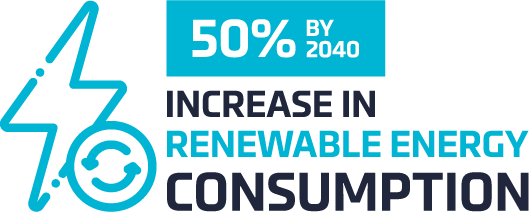Over the long-term, we are looking to implement projects that are compatible with our 2050 net zero goal. As we expect these projects to include major infrastructure challenges, we are initiating them now. One of the major projects is the Green Sdom project.
The “Green Sdom Project”, aims to convert our largest industrial site in Sdom, Israel, to green energy.
The project includes establishing large-scale solar PV fields with total capacity of around 1,500 MWp. During the day, the produced energy will be consumed directly by the operations of ICL’s Sdom plants, where the surplus will be stored, using advanced storage solutions. This project is subject to the approvals of various authorities and regulators in Israel. If approved, the first phase of the project is expected to operate by 2028.
In 2019, we began transitioning to renewable energy by purchasing renewable Guarantees of Origin (GoO) derived from renewable energy sources for the electricity use needs of our European sites. The electricity was generated by diverse renewable sources including wind turbines, solar photovoltaic, hydropower and biomass energies. Our overall global renewable energy consumption in 2022 was 3,238k GJ (nearly 900k MWh), and over 8% of our overall energy consumption (direct and indirect), was derived from renewable sources.






